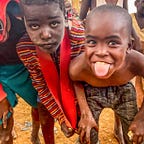Turning Puntland green by stopping erosion
UNDP helps camel herders in Puntland protect their land and livestock from soil erosion and flash floods
Climate change is having a profound impact across Somalia. More frequent droughts and flash-flooding bring soil erosion, crop failure and livestock deaths in a land where over 2/3 of the people depend on subsistence agriculture.
Puntland is certainly no stranger to these disasters and the destruction they bring to farmers. “In the past, I used to own livestock but they died because of the droughts,” says Abdirahman Musa, one of many camel herders who are completely dependent on the rangelands in Puntland to support their families.
The rangelands near Abdirahman have also been damaged by deforestation — as trees are cut down to make charcoal there are no roots left to hold the soil together and prevent desertification. In the end, the degraded land can’t retain water, resulting in biodiversity loss and worsening flash floods.
In response, the United Nations Development Programme (UNDP), with funding from the Global Environment Facility (GEF), has constructed stone barricades that can stop erosion, stabilising the land by keeping soil in place. These walls, which now span over twenty sites, have encouraged ecosystem restoration and reforestation, as new plants and trees can grow and remain protected.
The project makes sure that communities are engaged directly in planning, implementation and monitoring. For example, local people help decide where walls should be built and supervise contractors. Herders like Abdirahman Musa are also employed for some of the building work.
In addition to constructing stone barricades, UNDP has also set up small-scale community-led reforestation programmes to grow seedlings. These tree nurseries are managed by a community tree nursery committee that organises the distribution of seedlings to local businesses and to neighbouring camps for displaced people, who earn money from selling them. Seedlings are also distributed by the committee to schools and community groups to plant their own trees during the rainy seasons.
So far, this project has protected land for nearly 50,000 families and already the area is beginning to flourish again. Abdirahman himself has noticed improvements: “Now the land is productive again… People love this place. They are coming to settle down here.”
UNDP’s Climate Resilience project has been made possible thanks to support from the Global Environmental Facility (GEF), which has also funded other projects in Somalia to help communities facing the effects of climate change, including water resource management solutions and early warning systems for farmers facing flooding and drought risks.
See more photos here.
For more on our work with GEF to improve water management in Somalia see: https://www.thegef.org/news/somalia-and-undp-launch-new-10-million-project-climate-adaptation-and-water-access-rural
For our work on climate change in Somalia more generally see: https://undp-climate.exposure.co/somalias-ndc-climate-ambition
